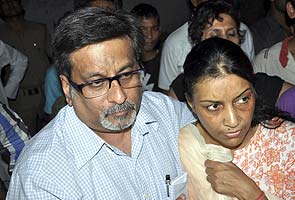 Noida, Nov 25: Ghaziabad police have beefed up security at the city court where judgment in the sensational Aarushi-Hemraj case is scheduled to be announced. Even Noida police has planned to deploy additional security in Jalvayu Vihar where the dentist couple's daughter was murdered. Police will also be escorting the Talwar couple from their residence to court amid heavy security.
Noida, Nov 25: Ghaziabad police have beefed up security at the city court where judgment in the sensational Aarushi-Hemraj case is scheduled to be announced. Even Noida police has planned to deploy additional security in Jalvayu Vihar where the dentist couple's daughter was murdered. Police will also be escorting the Talwar couple from their residence to court amid heavy security.
Ghaziabad SSP Dharmender Singh said that considering the gravity of the case, police have planned extensive security. "Apart from a PAC battalion and quick response team, we have deployed 30 female constables and 40 male constables to keep a close tab on each development in and around the court," Singh said. Three deputy superintendents of police and forces from three police stations will man the city court.
"Usually, mediapersons are allowed inside the premises of the special CBI court, but on Monday they will be prohibited entry. Stationing of the news channels teams will be allowed outside the SSP's office," Singh said.
High-profiles cases like Aarushi-Hemraj murder, Noida land scam and NHRM scam are listed in the Ghaziabad court. But time to time, incidents have exposed major flaws in the security arrangements at the Ghaziabad court complex. Rajesh Talwar, father of the murdered teen Aarushi was also attacked outside the CBI court in Ghaziabad.
In October last year, the gang wars of Meerut forayed into the Ghaziabad court complex when three heavily-armed gangsters sneaked into the premises dressed as lawyers and opened fired at a rival, Udham Singh, who was being produced for a murder trial. On September 20, 2012, a rape case convict went on a rampage that left two policemen injured after he tried to snatch a rifle from a cop.






Comments
Add new comment